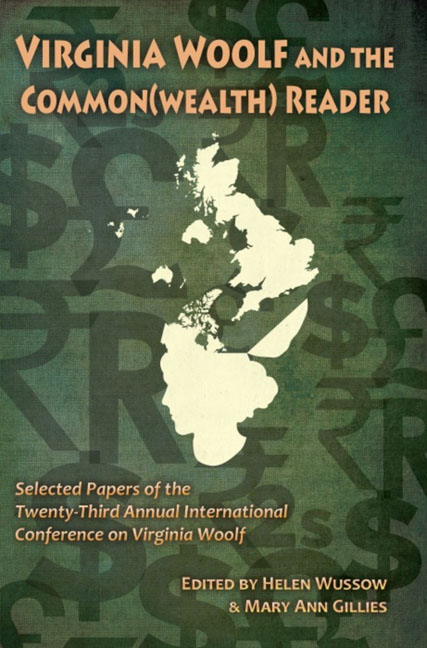Book contents
- Frontmatter
- Contents
- Introduction to Virginia Woolf and the Common(wealth) Reader
- Acknowledgments
- List of Abbreviations
- Invocations
- Networks of Affiliation: Foundations and Friends
- Education and Empire in Victorian Bloomsbury
- Synthesizing Civilizations: Leonard Woolf, the League of Nations, and the Inverse of Imperialism, 1928–1933
- James Stephen's Anti-Slavery Politics: A Woolfian Inheritance
- Networks of Empire: Virginia Woolf and the Travel Writing of Emily Eden
- Of Scrapbooks, War, and Newspapers: Leslie Stephen's Legacy
- Leslie Stephen's Science of (Ecological) Ethics
- “The Death of a Beautiful Man”: Rupert Brooke in Memory and Imagination
- Leonard Woolf and the Ceylon Civil Service: “I had come to dislike imperialism”
- Virginia Woolf in the British Commonwealth
- Woolf and the Commonwealth
- 1930s Onwards
- Woolf Beyond the Book
- Notes on Contributors
- Conference Program
Leonard Woolf and the Ceylon Civil Service: “I had come to dislike imperialism”
from Networks of Affiliation: Foundations and Friends
- Frontmatter
- Contents
- Introduction to Virginia Woolf and the Common(wealth) Reader
- Acknowledgments
- List of Abbreviations
- Invocations
- Networks of Affiliation: Foundations and Friends
- Education and Empire in Victorian Bloomsbury
- Synthesizing Civilizations: Leonard Woolf, the League of Nations, and the Inverse of Imperialism, 1928–1933
- James Stephen's Anti-Slavery Politics: A Woolfian Inheritance
- Networks of Empire: Virginia Woolf and the Travel Writing of Emily Eden
- Of Scrapbooks, War, and Newspapers: Leslie Stephen's Legacy
- Leslie Stephen's Science of (Ecological) Ethics
- “The Death of a Beautiful Man”: Rupert Brooke in Memory and Imagination
- Leonard Woolf and the Ceylon Civil Service: “I had come to dislike imperialism”
- Virginia Woolf in the British Commonwealth
- Woolf and the Commonwealth
- 1930s Onwards
- Woolf Beyond the Book
- Notes on Contributors
- Conference Program
Summary
…the man is a fool who deceives himself by the belief that he is exempt from the universal fate of human beings to be governed by prejudice and preconception… (Empire 11)
…as much as the West itself, the Orient is an idea that has a history and a tradition of thought, imagery, and vocabulary that have given it reality and presence in and for the West. The two entities thus to an extent reflect each other. (Said 1801)
In the past year, two major Leonard Woolf events have taken place in England: the formulation of The Leonard Woolf Society, thanks to the work of Dr. Surendra Paul of Cambridge University, and, in March of this year, a one-day symposium on Woolf's first novel, The Village in the Jungle (1913) at The Oxford Centre for Life-Writing at Wolfson College, Oxford. Considered “a leading yet often overlooked modernist document,” Leonard's novel is increasingly recognized as an extraordinarily far-sighted colonial text. As a “foundational novel in the Sri Lankan literary canon” (Symposium), Leonard's novel has never been out of print since it was first published in 1913. A writer and activist deeply engaged in the founding of the League of Nations, Leonard became increasingly skeptical of imperialist expansion.
In this paper I explore Leonard Woolf's work and the concept of imperialism—a term which at the turn of the 20th century, was re-establishing itself through practice and mindful awareness of its implications, moving away from 19th century ideas, and embracing concerns—including the Great War—of the 20th. The more I read essays by and about Leonard—his autobiography, his novels, his treatises, his letters, his work for the Fabian Society, and more—the more appealing I find him, and the more I appreciate his work. (And how could I not, remembering some of Cecil Woolf's banquet remembrances at earlier conferences—of Leonard's frugality, saving envelopes addressed to him, turning them inside out and reusing them; and of how, when either his pajama bottoms or tops became too threadbare, he would simply discard the most threadbare item, and substitute another top or a bottom, whether it matched or not.)
Leonard was extremely frugal, but he was also extremely astute. From Cecil, I gained insight into Leonard the man—vulnerable, economical, and at times eccentric…
- Type
- Chapter
- Information
- Virginia Woolf and the Common(wealth) Reader , pp. 59 - 64Publisher: Liverpool University PressPrint publication year: 2014



